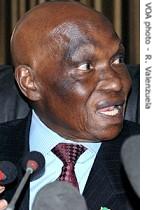2007年VOA标准英语-Analysts Ponder Senegal President's Legacy(在线收听)
Dakar
02 March 2007
President Abdoulaye Wade was declared the winner of Senegal's presidential election late Thursday, giving him five more years in power. Analysts are already speculating about his second term as well as the octogenarian president's legacy.
 |
| President Abdoulaye Wade comments after winning re-election |
But his opponents said his seven years in office were long enough, pointing to worsening energy problems, a climate of intimidation against political opponents, unfinished construction projects, and boatloads of unemployed men risking their lives at sea to search for work in Europe.
Political science professor Yoro Dia at Cheikh Anta Diop University in Dakar says Mr. Wade had many problems in his first term because he was too busy being a politician, rather than a statesman. His second term may an opportunity to polish his image for the history books.
"Now he is re-elected, he will be free from daily politics and he will be knocking on history's door," said Professor. Dia.
The professor says Mr. Wade is fascinated by post-independence presidents Leopold Sedar Senghor and Abdou Diouf who were in power four decades. Dia says Mr. Wade has been obsessed with how to stay in power, after his three decades fighting in the opposition and five failed presidential attempts.
Dia says the president, secure in his second and last term, can now think about his legacy.
"[Former President Leopold Sedar] Senghor has his place in history as someone who built the nation, [former President Abdou] Diouf has his place in history as someone who built the state, and now me, Abdoulaye Wade, what is my place in history?" added Dia.
Director of the Superior Institute of Information Sciences and Communication School in Dakar, Abdou Latif Coulibaly says Mr. Wade's political instincts are autocratic.
"He uses the rules of democracy to come to power, but when he is in power, he thinks these rules are not good for the Senegalese people and he has to break all these rules and break all the arms that help him to come to power," he said.
Following the electoral commission's announcement of his victory Thursday night, Mr. Wade vowed to pursue corruption charges against some of his opponents. He said Senegal's laws must be defended.
Mr. Wade has dismissed accusations of fraud as lies by journalists, and factually incorrect. He also says Senegal has never been more democratic than under his presidency.
But Coulibaly says power is the only shield Mr. Wade has against prosecution, and that his legacy will be a corrupt one. There are persistent questions over how Mr. Wade is spending new construction funds, and why close friends, and his son, have been given important positions in managing these funds.
"He himself knows he is not clean," he added. "Because today he is the president, no one can put him in jail. But when he loses power, he will be in jail I am sure."
Coulibaly wrote a critical biography of Mr. Wade in 2003 called An Opposition Leader Reaches Power, the Danger of Political Change that is banned in Senegal, and is available only in France.
Meanwhile, organizations that want to see Mr. Wade pursue their objectives are already jostling for attention.
A Chadian human rights non-profit group recently asked him to speed up the trial in Senegal of Chad's former ruler, Hissene Habre, who is charged with crimes against humanity. The group wrote that Mr. Wade's second mandate will be crowned a success if the case is heard.
Mr. Wade did not mention this at the news conference Thursday. He promised to quickly build a new airport and technology university. He also said journalists should have never doubted his first-round victory for a second term, which constitutionally, should be his last.